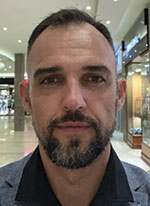

Strong partnerships build strong industries
No business can stand on its own without strong partnerships and stakeholder relationships. In this regard the military and defence industry is no exception. Realising this, Omnigo has formed strong partnerships with its clients and suppliers.
Additionally, strategic partnerships with providers of key services in the market is desirable and as such Omnigo decided to partner with one of its long-standing clients in a more formal manner, to the mutual benefit of both parties.
Kreon Technology has been a client of Omnigo for more than a decade and more recently, has also acted as supplier and partner. This natural evolution of the relationship between the companies was brought forth by both companies’ passion for excellence and the realisation that we can achieve more through teamwork.
This partnership is centred around Omnigo’s passion for quality manufacturing processes and Kreon’s expertise in solution development for complex technological challenges.
Designing for military applications
Kreon offers as a core capability its expertise in developing ultra-reliable components for harsh environments. Such components vary from card-level to black-box-level assemblies that typically form part of a client’s larger system; these clients mostly operate in the military, aerospace, or high-end industrial/mining environment.
Over the past two decades, Kreon has been involved in projects with a number of high-profile clients and in most cases such involvement was from the early concept stage to help define and specify the details of the requirement, possible implementation strategies, technology to consider and thereafter the remainder of the life-cycle aspects (i.e., development, qualification, certification, manufacturing, acceptance, maintenance).
Kreon engineers are experienced in the application of MIL-standards and what the implications are for a system or component, from ‘cradle to grave’. The typical engineer aspires to design and create, but few understand that this is only a small part of this highly specialised world. MIL-processes require that a vast number of documentation be put in place, with the initial set of specifications being the point of reference upon which everything further is built and quality control is key throughout the process – this may entail reviews, tests, inspections, audits and/or software verification methods. Traceability is also extremely important, so that a thread can be weaved from each specified requirement, through the whole data pack and all its sub-levels, to the endpoint of qualified and manufacturable functionality.
Configuration management is at the centre of successfully navigating through all these documents and configuration items. With this goes software versioning, hardware baselines, test results, serialisation and build history. When a deployed unit is returned from the field for maintenance, maybe a decade after initial delivery, it must be possible to look back through the build and maintenance history, right back to the point of manufacture. In most cases useful statistics regarding operation, performance and lifetime can be garnered in this way for parallel or future use.
High-performance manufacturing for high-performance products
It is also relevant to note that the build baseline that is established for a component should comply with the applicable standards, it should be correctly versioned and it should be in a workable format for the manufacturing authority such as Omnigo to seamlessly incorporate into its processes. Such manufactured components are either tested by Omnigo, or by Kreon, depending on factors such as the level of maturity, equipment needed, volume manufactured and client preference.

Downstream manufacturers for military and defence applications must manufacture to high standards, whilst maintaining processes and procedures that support consistent high-quality manufacturing. Often this type of manufacturing is for low-volume, high-mix production scenarios which is the norm for this industry.
Such manufacturing scenarios call for flexible but controlled processes to adapt to various clients’ product specifications and requirements. Omnigo’s core competencies are centred around a highly controlled, yet flexible manufacturing environment. Choosing the right equipment like automated manufacturing and inspection machines is critical in achieving the standards expected for military and defence applications.
Kreon has established a suitable test environment for each of the components that it supplies to clients. In some cases, such test environment is located at Omnigo for acceptance testing at the end of the manufacturing line, typically in the case of mature components. In other cases, it must be closer to the development process for obvious reasons.
A typical test environment would consist of a bed-of-nails jig that is connected to off-the-shelf lab test equipment and all of this is connected via USB to a standard PC that runs pre-configured test scripts. The PC would also be on a network, with a central database for storage of results, that forms part of the build history. A side-effect of this database approach has been the ability to apply big-data analytics to the collected masses of data which makes it possible to look at the process statistics in nearly real time.
Qualification according to MIL standards is a function that Kreon is very experienced in. This would entail initial specification of the applicable standards, parts thereof, levels and methods that a component must comply with and it would then be designed to meet such requirements. Specific test and verification methods would be established, together with suitable equipment to be used during execution of such procedures, usually at the suitable third-party test facility.

Software certification according to the airborne standards is a process that needs to be followed from the initial stages of development, it is not something that can be added post development. It requires specific plans, requirement formulation, detailed description and verification methods, together with the use of specific compliance verification tool sets.
Obsolescence management is another important aspect to address, even from the initial selection and specification of the technology to be used. Clients usually require that such related monitoring be put in place and tracked according to a decided timeline, so that actions such as last-buy, or re-develop, or end-of-life can take place in a planned way.
Obsolescence management can also mean that an initial decision is made to rather develop an in-house component, than buying it off-the-shelf. This may seem counter-intuitive, but it makes a lot of sense in the case of critical components for which the supply line may disappear due to a variety of possible economic or other regulatory issues.
Kreon and Omnigo have partnered on various projects to support the local defence industry, notably on anti-armour guidance, comms decoder and autopilot equipment, motor control units for vehicle sight platforms, navigation and control computer for helicopter sights as well as flight control units for unmanned aerial vehicles, to name but a few.
For more information contact:
• Kreon Technology, +27 12 844 0930, [email protected], www.kreon.co.za
• Omnigo, +27 12 803 8218, [email protected], www.omnigo.co.za
| Tel: | +27 12 803 8218 |
| Email: | [email protected] |
| www: | www.omnigo.co.za |
| Articles: | More information and articles about Omnigo |

© Technews Publishing (Pty) Ltd | All Rights Reserved